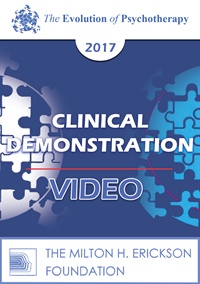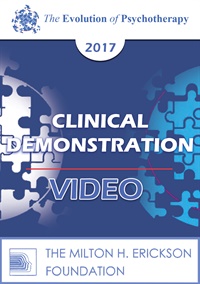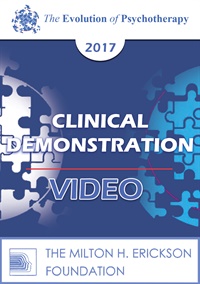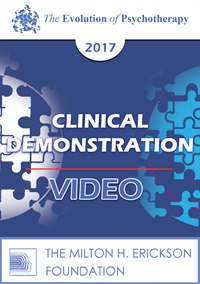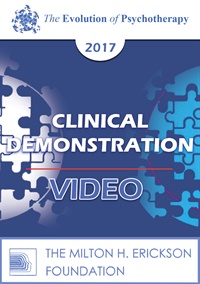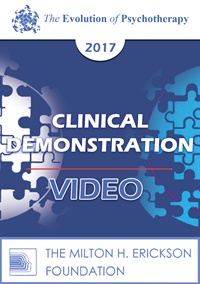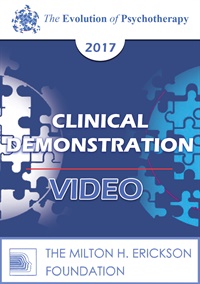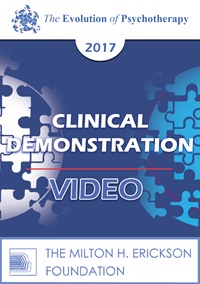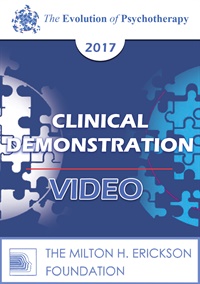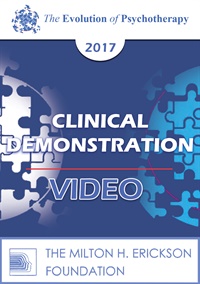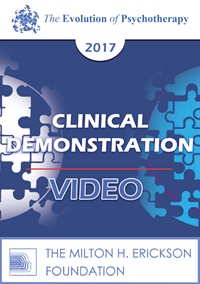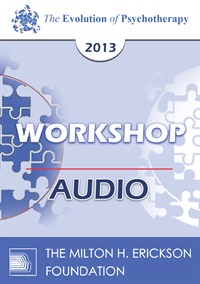
- Average Rating:
- Not yet rated
- Topic Areas:
- Workshops | Metaphors | Pain and Healing | Psychotherapy | Resources
- Categories:
- Evolution of Psychotherapy | Evolution of Psychotherapy 2013
- Faculty:
- Robert Dilts, BA
- Duration:
- 2 Hours
- Format:
- Audio Only
- Original Program Date:
- Dec 15, 2013
- Short Description:
- The late Gabrielle Roth, founder of the 5 Rhythms movement practice, was a quintessential woman of the body and sometimes called an “urban shaman.” Gregory Bateson was an iconic man of the mind and a foundational contributor to most modern methods of systemic therapy. Bateson and Roth interacted at Esalen in the legendary times during the late 1970s and Bateson encouraged Roth to bring her creation into the world. This workshop will explore the work of these two pioneers and how to integrate movement and mind to create generative resources for change and healing.
- Price:
- $15.00 - Base Price
- Average Rating:
- Not yet rated
- Topic Areas:
- Workshops | Social Psychology | Psychotherapy | Psychology
- Categories:
- Evolution of Psychotherapy 2013 | Evolution of Psychotherapy
- Faculty:
- Bill O'Hanlon, MS
- Course Levels:
- Master Degree or Higher in Health-Related Field
- Duration:
- 1:40:33
- Format:
- Audio and Video
- Original Program Date:
- Dec 15, 2013
- Short Description:
- Marketers are learning about and using the latest research on how to persuade people to change their views and behavior, but psychotherapists generally don’t know about or use this research. This session, using videos, audios and stories to bring the material alive, will teach you three powerful methods for radically increasing cooperation in therapy.
- Price:
-
Sale is $29.00
price reduced from Base Price - $59.00
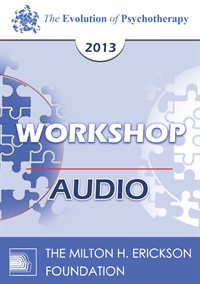
- Average Rating:
- Not yet rated
- Topic Areas:
- Workshops | Art and Creativity | Psychotherapy | Utilization | Communication
- Categories:
- Evolution of Psychotherapy | Evolution of Psychotherapy 2013
- Faculty:
- Jeffrey Zeig, PhD
- Duration:
- 1 Hour 43 Minutes
- Format:
- Audio Only
- Original Program Date:
- Dec 15, 2013
- Short Description:
- Language is both informative and expressive. It is the expressive component that elicits changes in emotion, sensation, “state,” and physiology; the words only convey part of the message. We will study the effective use of prosody, proximity, gesture, expression and context, and how those channels can be woven into the process of communication to create dramatic moments that empower effective clinical outcomes. Lecture, demonstration, small group practice.
- Price:
- $15.00 - Base Price
Credit available - Click Here for more information
- Average Rating:
- Not yet rated
- Topic Areas:
- Clinical Demonstrations | Psychotherapy | Relationships | Communication | IMAGO
- Categories:
- Evolution of Psychotherapy | Evolution of Psychotherapy 2017 | Online Continuing Education | Pioneers in Couples and Family Therapy
- Faculty:
- Harville Hendrix, PhD | Helen LaKelly Hunt, PhD
- Course Levels:
- Master Degree or Higher in Health-Related Field
- Duration:
- 1:02:47
- Format:
- Audio and Video
- Original Program Date:
- Dec 15, 2017
- Short Description:
- This clinical demonstration utilizes Imago Relationship Therapy, focusing on identifying and addressing childhood wounds to support mutual healing. Using structured dialogue, sentence stems, mirroring, and validation, partners share early life challenges to build empathy and emotional connection. The approach helps reduce emotional reactivity and strengthen relational skills.
- Price:
- $0.00 - $29.00
Credit available - Click Here for more information
- Average Rating:
- Not yet rated
- Topic Areas:
- Clinical Demonstrations | Hypnosis | Psychotherapy
- Bundle(s):
- Learning Track - EP17 Erickson Stream
- Categories:
- Evolution of Psychotherapy | Evolution of Psychotherapy 2017 | Evolution of Psychotherapy Erickson Learning Track | Online Continuing Education
- Faculty:
- Michael Yapko, PhD
- Course Levels:
- Master Degree or Higher in Health-Related Field
- Duration:
- 56:19
- Format:
- Audio and Video
- Original Program Date:
- Dec 15, 2017
- Short Description:
- In this live demonstration, hypnosis becomes a catalyst for empowerment as a participant explores her struggles with emotional eating. Through guided imagery and focused attention, she discovers how aligning self-worth with her values and mission can reshape choices in everyday life. The session shows how hypnosis helps clients access inner strengths, reframe impulses, and walk away with a deeper sense of agency.
- Price:
-
Sale is $29.00
price reduced from Base Price - $59.00
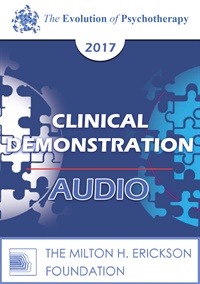
- Average Rating:
- Not yet rated
- Topic Areas:
- Clinical Demonstrations | Attachment | Couples Therapy | Emotionally Focused Therapy (EFT) | Psychotherapy
- Categories:
- Evolution of Psychotherapy | Evolution of Psychotherapy 2017
- Faculty:
- Sue Johnson, EdD
- Duration:
- 27:30
- Format:
- Audio Only
- Original Program Date:
- Dec 15, 2017
- Short Description:
- The session shown is of an unedited live consultation where the previous withdrawn male partner is now accessible and the therapist works with the inability of the female partner to trust, reach and engage with her mate. The session explicitly shows how the therapist works with blocks to the creation of key new responses and shapes bonding moments. This is a classic illustration of Stage 2 EFT in action and shows the moment to moment creation of secure connection. Therapist interventions will be outlined and discussed.
- Price:
- $15.00 - Base Price
Credit available - Click Here for more information
- Average Rating:
- Not yet rated
- Topic Areas:
- Clinical Demonstrations | Mindfulness | Psychotherapy | Buddhism
- Bundle(s):
- Learning Track - Mindfulness
- Categories:
- Evolution of Psychotherapy | Evolution of Psychotherapy 2017 | Online Continuing Education
- Faculty:
- Jack Kornfield, PhD
- Course Levels:
- Master Degree or Higher in Health-Related Field
- Duration:
- 1:02:22
- Format:
- Audio and Video
- Original Program Date:
- Dec 15, 2017
- Short Description:
- This demonstration will combine Buddhist psychology, and Eastern approaches of Mindfulness and compassion with Western clinical tools.
- Price:
-
Sale is $29.00
price reduced from Base Price - $59.00
Credit available - Click Here for more information
- Average Rating:
- Not yet rated
- Topic Areas:
- Clinical Demonstrations | Psychotherapy | Storytelling | Goals of the Therapist
- Categories:
- Evolution of Psychotherapy | Evolution of Psychotherapy 2017 | Online Continuing Education
- Faculty:
- Jean Houston, PhD
- Course Levels:
- Master Degree or Higher in Health-Related Field
- Duration:
- 1:01:54
- Format:
- Audio and Video
- Original Program Date:
- Dec 15, 2017
- Short Description:
- This demonstration will explore how myth is instrumental in advancing client goals. Educational Objectives: Describe how myth is instrumental in advancing client goals. List empirical considerations in the use of myth.
- Price:
-
Sale is $29.00
price reduced from Base Price - $59.00
Credit available - Click Here for more information
- Average Rating:
- Not yet rated
- Topic Areas:
- Clinical Demonstrations | Psychotherapy | Psychology | Therapist Development
- Categories:
- Evolution of Psychotherapy | Evolution of Psychotherapy 2017 | Online Continuing Education
- Faculty:
- Steven Hayes, PhD
- Course Levels:
- Master Degree or Higher in Health-Related Field
- Duration:
- 57:37
- Format:
- Audio and Video
- Original Program Date:
- Dec 15, 2017
- Short Description:
- Psychological flexibility is one of the most studied and supported set of mediational processes in clinical intervention science. In this demonstration I will explain and then demonstrate how a focus on evidence-based flexibility processes in therapy can free clinicians from the linear march of protocol-based approaches, and foster instead a vital dance of creative facilitation of change, played out in the moment to moment context of an empowering therapeutic relationship that is nevertheless thoroughly evidence-based.
- Price:
-
Sale is $29.00
price reduced from Base Price - $59.00
EP17 Clinical Demonstration 10 - Learn to Read Brain Scans: 50 cases in 60 Minutes - Daniel Amen, MD
Credit available - Click Here for more information
- Average Rating:
- Not yet rated
- Topic Areas:
- Clinical Demonstrations | Neuroscience | Psychotherapy
- Categories:
- Evolution of Psychotherapy | Evolution of Psychotherapy 2017 | Online Continuing Education
- Faculty:
- Daniel Amen, MD
- Course Levels:
- Master Degree or Higher in Health-Related Field
- Duration:
- 58:58
- Format:
- Audio and Video
- Original Program Date:
- Dec 15, 2017
- Short Description:
- This clinical demonstration offers a rapid tour through fifty brain scans that reveal the links between brain function, behavior, and mental health. Participants learn how imaging can uncover hidden causes of emotional and relational problems—from trauma and toxins to sleep issues and head injuries—and how targeted interventions can restore balance. The session inspires a new way of thinking about psychotherapy, showing that healing the brain transforms lives.
- Price:
-
Sale is $29.00
price reduced from Base Price - $59.00
Credit available - Click Here for more information
- Average Rating:
- Not yet rated
- Topic Areas:
- Clinical Demonstrations | Somatic Experiences | Mind-Body | Psychotherapy | Neuroscience | Training
- Categories:
- Evolution of Psychotherapy | Evolution of Psychotherapy 2017 | Online Continuing Education
- Faculty:
- Peter Levine, PhD
- Course Levels:
- Master Degree or Higher in Health-Related Field
- Duration:
- 43:37
- Format:
- Audio and Video
- Original Program Date:
- Dec 15, 2017
- Short Description:
- Together, we will explore the implications of Body-oriented psychotherapy and recent findings in the neurosciences, on how the brain and body deals with emotional information, while also providing an understanding of effective therapeutic action. This training is geared for psychotherapists of all types, as well as for physicians, nurses, physiotherapists, bodyworkers, and educators.
- Price:
-
Sale is $29.00
price reduced from Base Price - $59.00
Credit available - Click Here for more information
- Average Rating:
- Not yet rated
- Topic Areas:
- Clinical Demonstrations | Psychotherapy | Meditation, Spirituality and Yoga | Pain and Healing
- Bundle(s):
- Learning Track - EP17 Psychotherapy Stream
- Categories:
- Evolution of Psychotherapy | Evolution of Psychotherapy 2017 | Evolution of Psychotherapy Psychotherapy Learning Track | Online Continuing Education
- Faculty:
- Scott Miller, PhD
- Course Levels:
- Master Degree or Higher in Health-Related Field
- Duration:
- 58:43
- Format:
- Audio and Video
- Original Program Date:
- Dec 15, 2017
- Short Description:
- The role of magick in physical and psychological healing is staging a comeback. Recently, the world’s two most populous countries have called upon folk healers, herbalists, and spiritual guides to address the pressing mental health needs of their citizenry. However the methods are believed to work—whether by the operation of spirits, the rebalancing of disharmonious energies, or other unknown powers—each approach shares a common denominator: the conviction that forces outside awareness, inaccessible to reason or direct observation, influence or even control life. Crucially, those viewed by the public as possessing the power to connect with such forces, are regarded as healers. It’s time for Western therapists to rediscover their magickal roots. This demonstration will identify and show possibilities for healing far beyond what the current and popular
- Price:
-
Sale is $29.00
price reduced from Base Price - $59.00
Credit available - Click Here for more information
- Average Rating:
- Not yet rated
- Topic Areas:
- Clinical Demonstrations with Discussant | Psychotherapy | Storytelling | Strategic Therapy | Ericksonian Hypnosis and Therapy Techniques
- Bundle(s):
- Learning Track - EP17 Psychotherapy Stream
- Categories:
- Evolution of Psychotherapy | Evolution of Psychotherapy 2017 | Evolution of Psychotherapy Psychotherapy Learning Track | Online Continuing Education | Pioneers in Couples and Family Therapy
- Faculty:
- Bill O'Hanlon, MS | Cloe Madanes, HDL, LIC
- Course Levels:
- Master Degree or Higher in Health-Related Field
- Duration:
- 1:30:09
- Format:
- Audio and Video
- Original Program Date:
- Dec 14, 2017
- Short Description:
- This session highlights the power of storytelling in therapy, drawing from O’Hanlon’s work and influence by Milton Erickson. Through personal and client stories, including a moving case on infertility and grief, participants explore how narratives foster connection, resilience, and transformation. The discussion emphasizes the balance between self-disclosure and client-centered storytelling, showing how well-timed, relatable stories deepen therapeutic impact and strengthen human connection.
- Price:
-
Sale is $29.00
price reduced from Base Price - $59.00
Credit available - Click Here for more information
- Average Rating:
- Not yet rated
- Topic Areas:
- Clinical Demonstrations with Discussant | Emotionally Focused Therapy (EFT) | Generative Psychotherapy | Art and Creativity | Goals of the Therapist | Psychotherapy
- Bundle(s):
- Learning Track - EP17 Erickson Stream
- Categories:
- Evolution of Psychotherapy | Evolution of Psychotherapy 2017 | Evolution of Psychotherapy Erickson Learning Track | Online Continuing Education
- Faculty:
- Stephen Gilligan, PhD | Sue Johnson, EdD
- Course Levels:
- Master Degree or Higher in Health-Related Field
- Duration:
- 1:27:23
- Format:
- Audio and Video
- Original Program Date:
- Dec 14, 2017
- Short Description:
- This demonstration will show how activating a client’s creative process is the key factor in generative psychotherapy. This process follows four steps: 1) Identifying a goal (A positive change or transforming a negative pattern), 2) Developing a generative state, 3) Utilizing the generative state to creatively achieve the goal, and 4) Guiding the session changes into real life achievement.
- Price:
- $0.00 - $29.00
Credit available - Click Here for more information
- Average Rating:
- Not yet rated
- Topic Areas:
- Clinical Demonstrations with Discussant | Gestalt | Somatic Experiences | Psychotherapy | Relationships | Therapeutic Relationship
- Bundle(s):
- Learning Track - EP17 Gestalt Stream
- Categories:
- Evolution of Psychotherapy | Evolution of Psychotherapy 2017 | Evolution of Psychotherapy Psychotherapy Learning Track | Online Continuing Education
- Faculty:
- Erving Polster, PhD | Peter Levine, PhD
- Course Levels:
- Master Degree or Higher in Health-Related Field
- Duration:
- 1:25:10
- Format:
- Audio and Video
- Original Program Date:
- Dec 14, 2017
- Short Description:
- Personal disturbance is accompanied by feelings of disconnection within one’s self and with others. Reconnection is accomplished when the therapist guides the patient into a fertile conversational stream - a moment to moment impetus toward personal resolution.
- Price:
-
Sale is $29.00
price reduced from Base Price - $59.00
Credit available - Click Here for more information
- Average Rating:
- Not yet rated
- Topic Areas:
- Clinical Demonstrations with Discussant | Psychotherapy | Evocative Communication | Brief Therapy | Ericksonian Psychotherapy | Ericksonian Hypnosis and Therapy Techniques | Experiential Therapy | Strategic Therapy
- Bundle(s):
- Learning Track - EP17 Erickson Stream
- Categories:
- Evolution of Psychotherapy | Evolution of Psychotherapy 2017 | Evolution of Psychotherapy Erickson Learning Track | Online Continuing Education
- Faculty:
- Jeffrey Zeig, PhD | Otto Kernberg, MD
- Course Levels:
- Master Degree or Higher in Health-Related Field
- Duration:
- 1:24:21
- Format:
- Audio and Video
- Original Program Date:
- Dec 14, 2017
- Short Description:
- Experiential components central to brief, strategic approaches to psychotherapy. We will compare and contrast Ericksonian and psychodynamic perspectives.
- Price:
-
Sale is $29.00
price reduced from Base Price - $59.00
Credit available - Click Here for more information
- Average Rating:
- Not yet rated
- Topic Areas:
- Clinical Demonstrations with Discussant | Neuro-Linguistic Programming (NLP) | Psychotherapy | Relationships
- Bundle(s):
- Learning Track - EP17 Erickson Stream
- Categories:
- Evolution of Psychotherapy | Evolution of Psychotherapy 2017 | Evolution of Psychotherapy Erickson Learning Track | Online Continuing Education
- Faculty:
- Robert Dilts, BA | Michael Yapko, PhD
- Course Levels:
- Master Degree or Higher in Health-Related Field
- Duration:
- 1:24:12
- Format:
- Audio and Video
- Original Program Date:
- Dec 14, 2017
- Short Description:
- This demonstration explores how shifting attention between foreground and background perceptions can unlock new resources for clients who feel stuck. Through a live session, a participant grapples with a lifelong sense of “invisibility,” discovering how subtle changes in awareness and bodily cues create greater presence and self-trust. The process illustrates how experiential techniques can transform limiting patterns into empowerment and visibility.
- Price:
-
Sale is $29.00
price reduced from Base Price - $59.00
Credit available - Click Here for more information
- Average Rating:
- Not yet rated
- Topic Areas:
- Clinical Demonstrations with Discussant | Psychotherapy | Hypnosis | Therapist Development
- Bundle(s):
- Learning Track - EP17 Erickson Stream
- Categories:
- Evolution of Psychotherapy | Evolution of Psychotherapy 2017 | Evolution of Psychotherapy Erickson Learning Track | Online Continuing Education
- Faculty:
- Ernest Rossi, PhD | Kathryn Rossi, PhD | Jean Houston, PhD
- Course Levels:
- Master Degree or Higher in Health-Related Field
- Duration:
- 1:31:30
- Format:
- Audio and Video
- Original Program Date:
- Dec 14, 2017
- Short Description:
- In a 1964/2008 paper MHE documented how "hypnosis was used for the specific purpose of placing the burden of responsibility for therapeutic results upon the patient himself after he reached a definite conclusion that therapy would not help and that a last resort would be a hypnotic 'miracle'.” I will first demonstrate how to gently shift this "burden of responsibility for therapeutic results" in a brief, easy-to-learn group process with the entire audience. Time permitting, anyone who feels they have failed during this group process may volunteer for a therapeutic experience with me in front of the entire audience.
- Price:
-
Sale is $29.00
price reduced from Base Price - $59.00
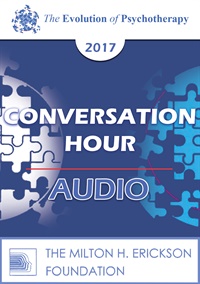
- Average Rating:
- Not yet rated
- Topic Areas:
- Conversation Hours | Post-Traumatic Stress Disorder (PTSD) | Trauma | Neuroscience | Psychotherapy
- Bundle(s):
- Learning Track - EP17 Trauma Download
- Categories:
- Evolution of Psychotherapy | Evolution of Psychotherapy 2017 | Evolution of Psychotherapy Trauma Learning Track
- Faculty:
- Bessel van der Kolk, MD
- Duration:
- 48:07
- Format:
- Audio Only
- Original Program Date:
- Dec 15, 2017
- Short Description:
- Attendees will learn about the fundamentals of trauma and the underlying neuroscience. Educational Objectives: Describe the common components of posttraumatic stress disorder. Describe three elements of the basic neuroscience of trauma.
- Price:
- $15.00 - Base Price
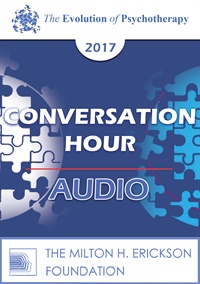
- Average Rating:
- Not yet rated
- Topic Areas:
- Conversation Hours | Psychoanalysis | Psychotherapy | Therapist Development
- Bundle(s):
- Learning Track - EP17 Psychoanalysis Download
- Categories:
- Evolution of Psychotherapy | Evolution of Psychotherapy 2017 | Evolution of Psychotherapy Psychoanalysis Learning Track
- Faculty:
- Otto Kernberg, MD
- Course Levels:
- Master Degree or Higher in Health-Related Field
- Duration:
- 1:01:21
- Format:
- Audio Only
- Original Program Date:
- Dec 15, 2017
- Short Description:
- A conversation hour with Dr. Otto Kernberg, centered on reflections about therapists “therapeutic ambitions”. Educational Objectives: Discuss how to avoid patient induced limitations on over-restriction of therapists’ aims as well as overly ambitious goals. How do we assess what are realistic expectations? And what are the patient’s realistic contributions to this assessment?
- Price:
- $15.00 - Base Price
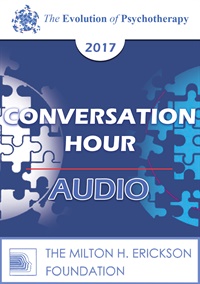
- Average Rating:
- Not yet rated
- Topic Areas:
- Conversation Hours | Psychotherapy | Therapist Development
- Bundle(s):
- Learning Track - EP17 CBT Download
- Categories:
- Evolution of Psychotherapy | Evolution of Psychotherapy 2017
- Faculty:
- Donald Meichenbaum, PhD
- Course Levels:
- Master Degree or Higher in Health-Related Field
- Duration:
- 55:24
- Format:
- Audio Only
- Original Program Date:
- Dec 15, 2017
- Short Description:
- Research indicates the effectiveness of psychotherapeutic interventions, but some psychotherapists constantly achieve better treatment outcomes and lasting changes. What do these “expert” therapists do and not do to achieve these positive results?
- Price:
- $15.00 - Base Price
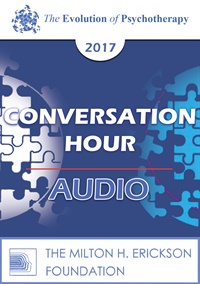
- Average Rating:
- Not yet rated
- Topic Areas:
- Conversation Hours | Generative Psychotherapy | Psychotherapy | Art and Creativity
- Bundle(s):
- Learning Track - EP17 Erickson Download
- Categories:
- Evolution of Psychotherapy | Evolution of Psychotherapy 2017 | Evolution of Psychotherapy Erickson Learning Track
- Faculty:
- Stephen Gilligan, PhD
- Course Levels:
- Master Degree or Higher in Health-Related Field
- Duration:
- 59:52
- Format:
- Audio Only
- Original Program Date:
- Dec 15, 2017
- Short Description:
- Dr. Gilligan will briefly overview his general approach to the creative process of effective psychotherapy, and then open the floor to conversation from participants.
- Price:
- $15.00 - Base Price
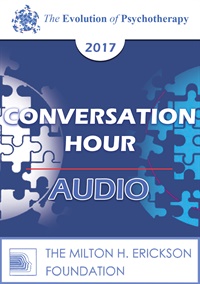
- Average Rating:
- Not yet rated
- Topic Areas:
- Conversation Hours | Couples Therapy | Conflict | Existential Therapy | Psychotherapy | Relationships | Intimacy
- Categories:
- Evolution of Psychotherapy | Evolution of Psychotherapy 2017
- Faculty:
- John Gottman, PhD | Julie Gottman, PhD
- Course Levels:
- Master Degree or Higher in Health-Related Field
- Duration:
- 1:03:04
- Format:
- Audio Only
- Original Program Date:
- Dec 15, 2017
- Short Description:
- EP17 Conversation Hour 05 - John Gottman, PhD and Julie Gottman, PhD Educational Objectives: Describe why not all relationship conflict is the same, and why some conflicts require the therapist to be an existential psychologist. Describe why it is so vital for therapists to measure physiology in couples’ therapy. Describe what Gottman sound relationship house theory and Gottman method couples therapy offers in the following domains: (1) friendship and intimacy, (2) conflict management, (3) shared meaning, (4) trust, and (5) commitment.
- Price:
- $15.00 - Base Price
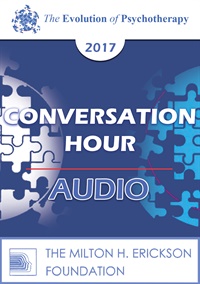
- Average Rating:
- Not yet rated
- Topic Areas:
- Conversation Hours | Strategic Therapy | Psychotherapy | Therapist Development | Children and Adolescent Therapy
- Categories:
- Evolution of Psychotherapy | Evolution of Psychotherapy 2017 | Pioneers in Couples and Family Therapy
- Faculty:
- Cloe Madanes, HDL, LIC
- Course Levels:
- Master Degree or Higher in Health-Related Field
- Duration:
- 1:01:58
- Format:
- Audio Only
- Original Program Date:
- Dec 15, 2017
- Short Description:
- Cloe Madanes presents a 15-step method for treating juvenile sex offenders, achieving a 98% success rate through family therapy and spiritual integration. She shares practical tools for addressing parent-child conflict, couples communication, and infidelity, including “Take Three Issues” and “Executive Meetings.” Emphasizing continuity of care, Madanes advocates for one therapist per family and highlights the growing impact of social media on family dynamics.
- Price:
- $15.00 - Base Price
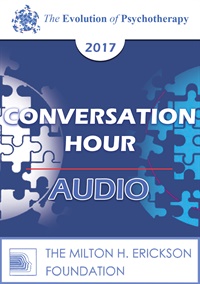
- Average Rating:
- Not yet rated
- Topic Areas:
- Conversation Hours | Neuro-Linguistic Programming (NLP) | Psychotherapy
- Categories:
- Evolution of Psychotherapy | Evolution of Psychotherapy 2017
- Faculty:
- Robert Dilts, BA
- Course Levels:
- Master Degree or Higher in Health-Related Field
- Duration:
- 58:38
- Format:
- Audio Only
- Original Program Date:
- Dec 15, 2017
- Short Description:
- Third generation NLP is generative, systemic and focused on high level issues such as identity and purpose. It emphasizes whole system change and can be applied to organizations and cultures as well as to individuals, families and teams. It expands upon the previous generations of NLP to include tools and skills for supporting multiple levels of change. This conversation will focus on how these methods can enhance therapy and coaching.
- Price:
- $15.00 - Base Price
Tags: NLP Psychotherapy




